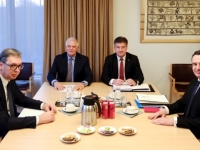News
Unfair punitive measures of the European Union
Kosovo-Serbia conflict

Albin Kurti prime minister of Kosova
USPA NEWS -
The Prime Minister of Kosovo, Albin Kurti, on Sunday called the punitive measures of the European Union unjust, while emphasizing that he cannot compromise with the rule of law and the constitutionality of the country.
He made these comments a day after a spokesperson of the European Union confirmed that the punitive measures against the government of Kosovo have already entered into force and that the institutions of Kosovo were notified of this on June 28.
According to European officials, the entry into force of the punitive measures for Kosovo followed the failure of the authorities in Pristina to take the steps required to reduce tensions in the north of Kosovo.
The measures envisage "the suspension of all working groups for the Stabilization and Association Agreement, the suspension of financing of European Union programs, the disapproval of projects from the Fund for Investments in the Western Balkans, as well as the suspension of meetings at political levels except those related to the dialogue" .
He made these comments a day after a spokesperson of the European Union confirmed that the punitive measures against the government of Kosovo have already entered into force and that the institutions of Kosovo were notified of this on June 28.
According to European officials, the entry into force of the punitive measures for Kosovo followed the failure of the authorities in Pristina to take the steps required to reduce tensions in the north of Kosovo.
The measures envisage "the suspension of all working groups for the Stabilization and Association Agreement, the suspension of financing of European Union programs, the disapproval of projects from the Fund for Investments in the Western Balkans, as well as the suspension of meetings at political levels except those related to the dialogue" .
Prime Minister Albin Kurti said today during a visit to the municipality of Shtime, about 25 kilometers south of Pristina, that these are not sanctions but temporary and unfair measures.
"On the other hand, we have a constant confrontation with various forms of aggression by Serbia, which is both an autocratic and pro-Russia state and has not faced its criminal past in the space of the former Yugoslavia, where it has caused four wars. In any case, we do our job, but let's not forget that we cannot compromise either with the rule of law or with the constitutionality of our country, so we will continue with the implementation of our government program and we hope that these temporary measures they will be very short so that the European support and aid will be complete and maybe even increase because Kosovo is a country that needs support in its development", he said.
Kosovo and Serbia are facing high tensions which started at the end of May when Pristina authorities started implementing the results of the April 23 elections, which were boycotted by Serbian political parties. In the northern municipalities, groups of Serbian citizens continue to oppose the placement of Albanian mayors in the municipal offices.
Western diplomacy has been trying to find a way out of the crisis in the north of Kosovo, the continuation of the dialogue and the implementation of the agreement reached at the beginning of this year between Kosovo and Serbia./voa
Liability for this article lies with the author, who also holds the copyright. Editorial content from USPA may be quoted on other websites as long as the quote comprises no more than 5% of the entire text, is marked as such and the source is named (via hyperlink).






